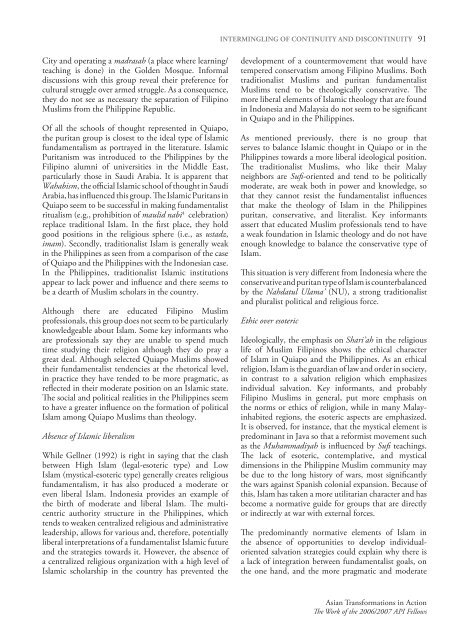Asian Transformations in Action - Api-fellowships.org
Asian Transformations in Action - Api-fellowships.org
Asian Transformations in Action - Api-fellowships.org
Create successful ePaper yourself
Turn your PDF publications into a flip-book with our unique Google optimized e-Paper software.
INTERMINGLING OF CONTINUITY AND DISCONTINUITY91City and operat<strong>in</strong>g a madrasah (a place where learn<strong>in</strong>g/teach<strong>in</strong>g is done) <strong>in</strong> the Golden Mosque. Informaldiscussions with this group reveal their preference forcultural struggle over armed struggle. As a consequence,they do not see as necessary the separation of Filip<strong>in</strong>oMuslims from the Philipp<strong>in</strong>e Republic.Of all the schools of thought represented <strong>in</strong> Quiapo,the puritan group is closest to the ideal type of Islamicfundamentalism as portrayed <strong>in</strong> the literature. IslamicPuritanism was <strong>in</strong>troduced to the Philipp<strong>in</strong>es by theFilip<strong>in</strong>o alumni of universities <strong>in</strong> the Middle East,particularly those <strong>in</strong> Saudi Arabia. It is apparent thatWahabism, the official Islamic school of thought <strong>in</strong> SaudiArabia, has <strong>in</strong>fluenced this group. The Islamic Puritans <strong>in</strong>Quiapo seem to be successful <strong>in</strong> mak<strong>in</strong>g fundamentalistritualism (e.g., prohibition of maulid nabi 4 celebration)replace traditional Islam. In the first place, they holdgood positions <strong>in</strong> the religious sphere (i.e., as ustadz,imam). Secondly, traditionalist Islam is generally weak<strong>in</strong> the Philipp<strong>in</strong>es as seen from a comparison of the caseof Quiapo and the Philipp<strong>in</strong>es with the Indonesian case.In the Philipp<strong>in</strong>es, traditionalist Islamic <strong>in</strong>stitutionsappear to lack power and <strong>in</strong>fluence and there seems tobe a dearth of Muslim scholars <strong>in</strong> the country.Although there are educated Filip<strong>in</strong>o Muslimprofessionals, this group does not seem to be particularlyknowledgeable about Islam. Some key <strong>in</strong>formants whoare professionals say they are unable to spend muchtime study<strong>in</strong>g their religion although they do pray agreat deal. Although selected Quiapo Muslims showedtheir fundamentalist tendencies at the rhetorical level,<strong>in</strong> practice they have tended to be more pragmatic, asreflected <strong>in</strong> their moderate position on an Islamic state.The social and political realities <strong>in</strong> the Philipp<strong>in</strong>es seemto have a greater <strong>in</strong>fluence on the formation of politicalIslam among Quiapo Muslims than theology.Absence of Islamic liberalismWhile Gellner (1992) is right <strong>in</strong> say<strong>in</strong>g that the clashbetween High Islam (legal-esoteric type) and LowIslam (mystical-esoteric type) generally creates religiousfundamentalism, it has also produced a moderate oreven liberal Islam. Indonesia provides an example ofthe birth of moderate and liberal Islam. The multicentricauthority structure <strong>in</strong> the Philipp<strong>in</strong>es, whichtends to weaken centralized religious and adm<strong>in</strong>istrativeleadership, allows for various and, therefore, potentiallyliberal <strong>in</strong>terpretations of a fundamentalist Islamic futureand the strategies towards it. However, the absence ofa centralized religious <strong>org</strong>anization with a high level ofIslamic scholarship <strong>in</strong> the country has prevented thedevelopment of a countermovement that would havetempered conservatism among Filip<strong>in</strong>o Muslims. Bothtraditionalist Muslims and puritan fundamentalistMuslims tend to be theologically conservative. Themore liberal elements of Islamic theology that are found<strong>in</strong> Indonesia and Malaysia do not seem to be significant<strong>in</strong> Quiapo and <strong>in</strong> the Philipp<strong>in</strong>es.As mentioned previously, there is no group thatserves to balance Islamic thought <strong>in</strong> Quiapo or <strong>in</strong> thePhilipp<strong>in</strong>es towards a more liberal ideological position.The traditionalist Muslims, who like their Malayneighbors are Sufi-oriented and tend to be politicallymoderate, are weak both <strong>in</strong> power and knowledge, sothat they cannot resist the fundamentalist <strong>in</strong>fluencesthat make the theology of Islam <strong>in</strong> the Philipp<strong>in</strong>espuritan, conservative, and literalist. Key <strong>in</strong>formantsassert that educated Muslim professionals tend to havea weak foundation <strong>in</strong> Islamic theology and do not haveenough knowledge to balance the conservative type ofIslam.This situation is very different from Indonesia where theconservative and puritan type of Islam is counterbalancedby the Nahdatul Ulama’ (NU), a strong traditionalistand pluralist political and religious force.Ethic over esotericIdeologically, the emphasis on Shari’ah <strong>in</strong> the religiouslife of Muslim Filip<strong>in</strong>os shows the ethical characterof Islam <strong>in</strong> Quiapo and the Philipp<strong>in</strong>es. As an ethicalreligion, Islam is the guardian of law and order <strong>in</strong> society,<strong>in</strong> contrast to a salvation religion which emphasizes<strong>in</strong>dividual salvation. Key <strong>in</strong>formants, and probablyFilip<strong>in</strong>o Muslims <strong>in</strong> general, put more emphasis onthe norms or ethics of religion, while <strong>in</strong> many Malay<strong>in</strong>habitedregions, the esoteric aspects are emphasized.It is observed, for <strong>in</strong>stance, that the mystical element ispredom<strong>in</strong>ant <strong>in</strong> Java so that a reformist movement suchas the Muhammadiyah is <strong>in</strong>fluenced by Sufi teach<strong>in</strong>gs.The lack of esoteric, contemplative, and mysticaldimensions <strong>in</strong> the Philipp<strong>in</strong>e Muslim community maybe due to the long history of wars, most significantlythe wars aga<strong>in</strong>st Spanish colonial expansion. Because ofthis, Islam has taken a more utilitarian character and hasbecome a normative guide for groups that are directlyor <strong>in</strong>directly at war with external forces.The predom<strong>in</strong>antly normative elements of Islam <strong>in</strong>the absence of opportunities to develop <strong>in</strong>dividualorientedsalvation strategies could expla<strong>in</strong> why there isa lack of <strong>in</strong>tegration between fundamentalist goals, onthe one hand, and the more pragmatic and moderate<strong>Asian</strong> <strong>Transformations</strong> <strong>in</strong> <strong>Action</strong>The Work of the 2006/2007 API Fellows
















